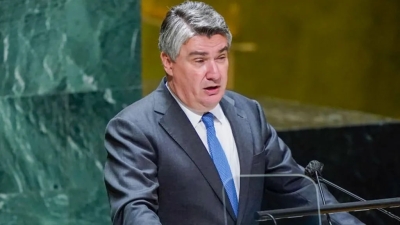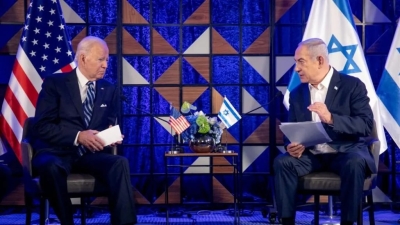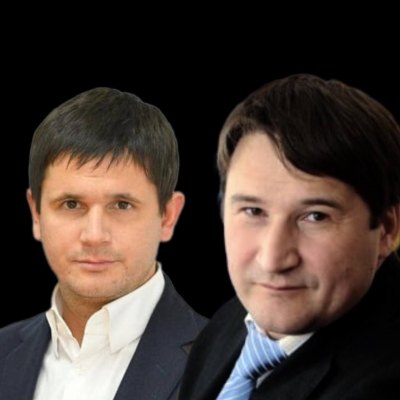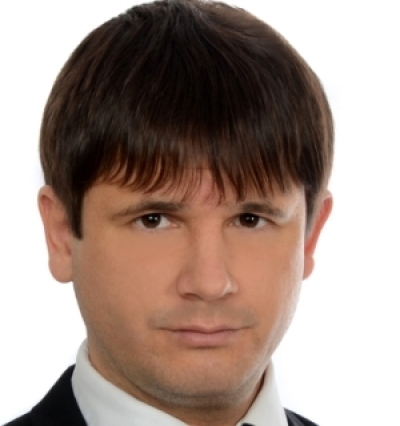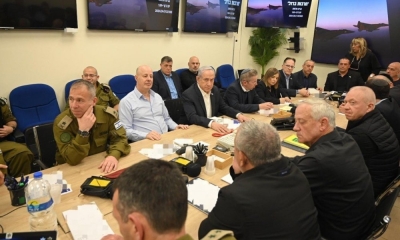Putin and Xi: what does this partnership portend?
During his state visit to Moscow, Chinese President Xi Jinping discussed his twelve-point plan for Ukraine with Vladimir Putin and emphasised Beijing’s "impartial position". Russia’s president praised the initiative as the basis for a peaceful solution. On Monday, Xi had said that China would continue to work with Russia in the name of "true multilateralism". Europe’s press tries to decode the signals.
China does not want confrontation
So far Xi’s visit hasn’t produced any momentous results, political scientist Volodymyr Fessenko writes on his Facebook page:
“This applies both to the Chinese appeals for peace and to the fears of some commentators (or hopes on the Russian side) that Moscow and Beijing will form a military alliance against the West and that the Russian army will receive Chinese weapons and ammunition. It is significant that the leaders of Russia and China have issued a joint statement emphasising that their relations are not a military-political alliance, do not have a bloc or confrontational character and are not directed against third countries. I am convinced that this was done at the insistence of the Chinese side.”
Plan to isolate Russia has failed
Xi’s visit to Moscow is a major blow to the West, The Times comments:
“With the cementing of their informal alliance in Moscow this week, China and Russia have set themselves in clear opposition to the western model. And there is no guarantee that the ‘global south’ of non-aligned states will take the West’s side. ... The visit, Mr Xi’s first since the invasion, is a challenge to the West, which has sought to isolate Mr Putin and paint Russia as a rogue state. Not wishing to share in this pariah status, and anxious not to engage in a sanctions war with the US and the European Union, Mr Xi has been careful to cast himself as peacemaker. But his twelve-point peace plan for Ukraine, trumpeted during the visit, was silent on a Russian withdrawal from Ukrainian territory.”
An unpredictable alliance
China protects its own interests first, says Pravda:
“Although they both smile at each other today, the relationship between the Chinese emperor and the Russian tsar could still take unpredictable paths. True, fears are growing that China will send weapons to Russia. But it is not in Beijing’s interest to be drawn into the Russian-Ukrainian conflict. To put it cynically: Beijing basically doesn’t care whether the Russian or Ukrainian flag flies over Mariupol. From its point of view, it is crucial that the continuous supply of cheap Russian oil and other raw materials is ensured. And since trade between Moscow and Beijing is growing, Xi can be satisfied.”
Putin becoming Beijing’s Lukashenka
Radio Kommersant FM sees a significant decline in Moscow’s global status:
“Russia finds itself increasingly tied to its most powerful partner in Asia. In many respects, it is effectively becoming a commodity appendage, and in political terms a junior partner. Of course, Chinese politicians and diplomats have enough acumen, finesse and tact not to stress this too much. ... Slowly but surely, Moscow is becoming for Beijing roughly what Alexander Lukashenka’s Belarus has become for Moscow. Not a pleasant observation for a country that is used to considering itself a great power. But if we compare the economic indicators of Beijing and Moscow and consider the Kremlin’s partial international isolation, it comes as no great surprise.”
The art of diplomacy needed
For the Salzburger Nachrichten Xi is definitely in a position to bring Russia to the negotiating table:
“China may not be able to pull the plug on Russia’s war of aggression. But a stop signal would not fail to have an impact. After all, Russia is in effect economically dependent on China. Xi can persuade Putin to negotiate, just as the West could do with Ukrainian President Volodymyr Zelensky. In the end, it’s all a question of goals. And they don’t quite match up (yet). From Beijing’s perspective, Putin needn’t be brought down over a failure. The West wants to prevent the war from being profitable for Russia. The art of diplomacy is need to reconcile these two approaches.”
Xi won’t dump Putin
De Standaard explains Beijing’s motives:
“China is feeling the consequences of the conflict. Commodity prices have risen, grain has become expensive and the sanctions are disrupting efforts to bring Chinese goods to the West via Russia. ... But China won’t dump Putin. It would be particularly bad for Xi if Ukraine were to win this war with the help of the West. In the new world order, the dominant role of the US and its allies in Europe would be cemented. Their Western values, which China does not share, would triumph. Russia might break apart after a defeat.”
A bad sign
Eesti Päevaleht takes a sombre view of Xi’s conduct:
“Xi’s broader calculation includes growing confrontation with Washington over Taiwan and a desire to break the unity of the West. On the other side of the equation, however, are mutual trade relations. Regardless of how the visit is viewed by the public, the very fact that it is taking place at all is a bad sign. China is demonstratively showing that it will not hesitate to flex its muscles on the world stage. Democratic countries, however, have virtually nothing to gain from a show of force by an autocratic state.”
An attempted show of strength
Russia needs China more than China needs Russia, notes El Periódico de Catalunya:
“The arrest warrant for Vladimir Putin was followed by two events of great relevance in countering the Russian president’s image of isolation: his visit to Mariupol and yesterday’s meeting with Xi Jinping. Putin needed to underline his freedom of movement and at the same time highlight the dimensions of his strategic alliance with China. ... President Xi can pursue his plan of economic expansion in the Global South on his own, while Russia needs China as a crutch and international mediator willing to keep business separate from the Ukraine crisis.”
Cooperation as a threat
The meeting shows just how absurd it was to think that China could mediate in the Ukraine war, writes the Süddeutsche Zeitung:
“Once again, to make it clear to everyone: ... In Moscow, a suspected war criminal wanted by the International Criminal Court and the dictator of a country that was accused of crimes against humanity in a United Nations report last summer are sitting together amicably. And the two of them are negotiating the next steps on the road to a new world order. China will ‘work with Russia’, Xi said after landing in Moscow, to ‘protect the international system, the international order’. Anyone who thinks this sounds like a threat can be forgiven for doing so.”
Russia is already submitting verbally
In a Telegram post republished by Echo, journalist Stanislav Kucher marvels over the thesis put forward by Russian propagandists that Russia would be better off as "a vassal of China than of the US":
“The option of an independent and autonomous Russia no longer even seems to be considered by the ‘Kremlin strategists’. ... In all the years of Putinism, this is the first time that I have seen such an apologetic defence of Russia’s obviously tarnished global political role. Only yesterday all these ‘political scientists’ were shooting their mouths off about how ‘the Russian world’ was dictating a new agenda to humanity and ‘Ukraine is obeying the Americans’. Today they are pretty much calling for submission to China.”



